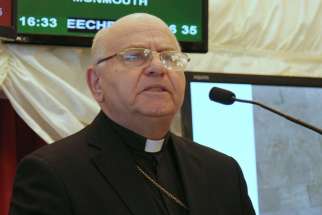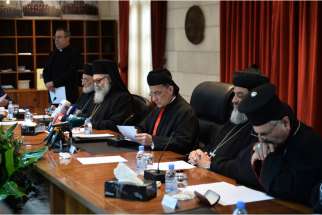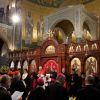Melkite archbishop urges British not to support militants in Syria
LONDON - A Syrian archbishop warned British politicians of the folly of supporting Islamic militants in the war in his country.
Melkite, Orthodox patriarchs urge world to work to solve Syrian crisis
BEIRUT - Two Syrian-born patriarchs separately urged the international community to work together to address the crisis in Syria and the region.
Pope Benedict XVI urges interfaith dialogue in Middle East
BEIRUT (CNS) -- Pope Benedict XVI signed a major document calling on Catholics in the Middle East to engage in dialogue with Orthodox, Jewish and Muslim neighbors, but also to affirm and defend their right to live freely in the region where Christianity was born.
In a ceremony at the Melkite Catholic Basilica of St. Paul in Harissa Sept. 14, Pope Benedict signed the 90-page document of his reflections on the 2010 special Synod of Bishops, which was dedicated to Christians in the Middle East. He was to formally present the document Sept. 16 at an outdoor Mass in Beirut.
A section dedicated to interreligious dialogue encouraged Christians to "esteem" the region's dominant religion, Islam, lamenting that "both sides have used doctrinal differences as a pretext for justifying, in the name of religion, acts of intolerance, discrimination, marginalization and even of persecution."
Yet in a reflection of the precarious position of Christians in most of the region today, where they frequently experience negative legal and social discrimination, the pope called for Arab societies to "move beyond tolerance to religious freedom."
The "pinnacle of all other freedoms," religious freedom is a "sacred and inalienable right," which includes the "freedom to choose the religion which one judges to be true and to manifest one's beliefs in public," the pope wrote.
It is a civil crime in some Muslim countries for Muslims to convert to another faith and, in Saudi Arabia, Catholic priests have been arrested for celebrating Mass, even in private.
The papal document, called an apostolic exhortation, denounced "religious fundamentalism" as the opposite extreme of the secularization that Pope Benedict has often criticized in the context of contemporary Western society.
Fundamentalism, which "afflicts all religious communities," thrives on "economic and political instability, a readiness on the part of some to manipulate others, and a defective understanding of religion," the pope wrote. "It wants to gain power, at times violently, over individual consciences, and over religion itself, for political reasons."
Many Christians in the Middle East have expressed growing alarm at the rise of Islamist extremism, especially since the so-called Arab Spring democracy movement has toppled or threatened secular regimes that guaranteed religious minorities the freedom to practice their faith.
Earlier in the day, the pope told reporters accompanying him on the plane from Rome that the Arab Spring represented positive aspirations for democracy and liberty and hence a "renewed Arab identity." But he warned against the danger of forgetting that "human liberty is always a shared reality," and consequently failing to protect the rights of Christian minorities in Muslim countries.
The apostolic exhortation criticized another aspect of social reality in the Middle East by denouncing the "wide variety of forms of discrimination" against women in the region.
"In recognition of their innate inclination to love and protect human life, and paying tribute to their specific contribution to education, health care, humanitarian work and the apostolic life," Pope Benedict wrote, "I believe that women should play, and be allowed to play, a greater part in public and ecclesial life."
In his speech at the document's signing, Pope Benedict observed that Sept. 14 was the feast of the Exaltation of Holy Cross, a celebration associated with the Emperor Constantine the Great, who in the year 313 granted religious freedom in the Roman Empire and was later baptized.
The pope urged Christians in the Middle East to "act concretely ... in a way like that of the Emperor Constantine, who could bear witness and bring Christians forth from discrimination to enable them openly and freely to live their faith in Christ crucified, dead and risen for the salvation of all."
While the pope signed the document in an atmosphere of interreligious harmony, with Orthodox, Muslim and Druze leaders in the attendance at the basilica, the same day brought an outburst of religiously inspired violence to Lebanon.
During a protest against the American-made anti-Muslim film that prompted demonstrations in Libya, Egypt and Yemen earlier in the week, a group attempted to storm a Lebanese government building in the northern city of Tripoli. The resulting clashes left one person dead and 25 wounded, local media reported. According to Voice of Lebanon radio, Lebanese army troops were deployed to Tripoli to prevent further violence.
Mohammad Samak, the Muslim secretary-general of Lebanon's Christian-Muslim Committee for Dialogue, told Catholic News Service that the violence had nothing to do with the pope's visit.
"All Muslim leaders and Muslim organizations -- political and religious -- they are all welcoming the Holy Father and welcoming his visit," Samak said. "I hope his visit will give more credibility to what we have affirmed as the message of Lebanon -- a country of conviviality between Christians and Muslims who are living peacefully and in harmony together for hundreds of years now."
Bishop Joseph Mouawad, vicar of Lebanon's Maronite Patriarchate, told CNS that the apostolic exhortation represents "a roadmap for Christians of the Middle East to live their renewal at all levels, especially at the level of communion."
The exhortation will also be a call to dialogue, he said, especially between Christians and Muslims.
Chaldean Archbishop Louis Sako of Kirkuk, Iraq, said now church leaders in each Mideast country must "work on how to translate the exhortation into real life in our communities and also in our Muslim and Christian relationships."
- - -
Contributing to this story was Doreen Abi Raad.




